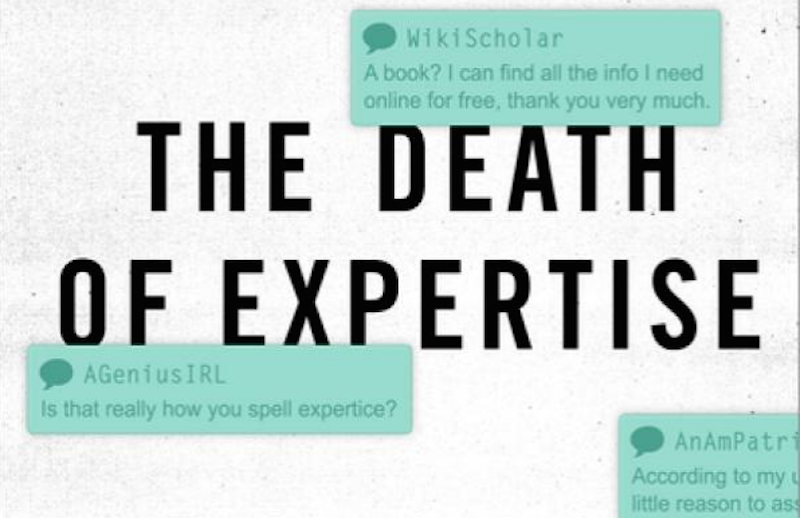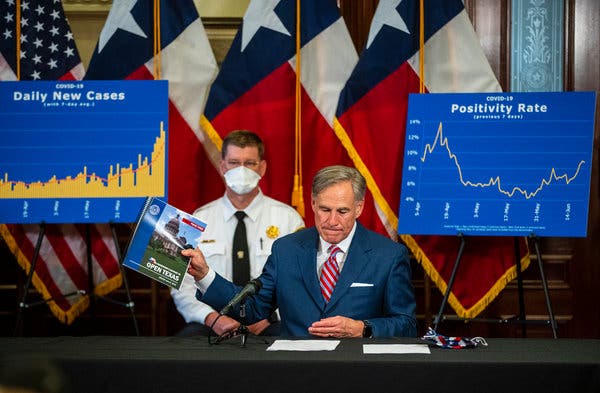In 2017, Tom Nichols, a professor of National Security Affairs at the U.S. Naval War College, published a book that anticipated our current state of affairs. Nichols’s book, The Death of Expertise: The Campaign against Established Knowledge and Why it Matters, made an overarching point: with so much information literally at our fingertips everyone can be an expert on everything. Or at least play at being an expert on Facebook.
One example Nichols cited was a Washington Post poll that found after the 2014 Russian invasion of Ukraine “only one in six Americans could identify Ukraine on a map; the median response was off by about 1,800 miles.” Yet, this lack of basic knowledge hardly kept Americans from their sure-fire opinions about what action the country should take.

“In fact,” Nichols wrote, “the respondents favored intervention in direct proportion to their ignorance. Put another way, the people who thought Ukraine was located in Latin America or Australia were the most enthusiastic about using military force there.”
Turns out our certainty frequently has an inverse relation to our intelligence. Why? Why do so many Americans disdain expertise?
“Americans have reached a point where ignorance, especially of anything related to public policy, is an actual virtue,” Nichols wrote. “To reject the advice of experts is to assert autonomy, a way for Americans to insulate their increasingly fragile egos from ever being told they’re wrong about anything. It is a new Declaration of Independence: No longer do we hold these truths to be self-evident, we hold all truths to be self-evident, even the ones that aren’t true. All things are knowable and every opinion on any subject is as good as any other.”
The country’s disastrous, fragmented and deadly response to the global coronavirus pandemic is deeply rooted in the America aversion to expertise. Unfortunately for the first time in modern history we have a “fragile ego” in the White House who has made being ignorant about virtually everything a governing principle.
“Across the rest of the developed world, COVID-19 has been ebbing,” David Frum wrote this week in The Atlantic. “As a result, borders are reopening and economies are reviving. Here in the U.S., however, Americans are suffering a new disease peak worse than the worst of April.” As a result, the European Union this week barred almost all travelers from the United States because we have failed to control the virus, and we have failed because millions of us have rejected fundamental common sense.

Back in February the president and his Fox News echo chamber were calling the virus “a hoax” that was completely under control. It wasn’t and people who have spent a lifetime studying such things knew it wasn’t. Yet, governors in Arizona, Florida and twenty other places embraced Trumpian logic about the virus, waited too long and then acted inadequately.
From June 15 to the end of the month Arizona’s totals went from about 1,000 cases per day to nearly 5,000 per day. Idaho’s cases seem on a similar trajectory. Little wonder Dr. Anthony Fauci, the country’s top infectious disease expert, worried this week that the country could soon be headed for 100,000 new cases per day. “I am very concerned,” he said. And for good reason. Death numbers, a lagging indicator compared to cases, will almost certainly begin rising in coming days.
Meanwhile, every disease expert in the world is recommending the wearing of face masks as a fundamental necessity in slowing the spread. Yet, Kentucky Republican Senator Rand Paul – hard to believe he is actually a doctor – mused out loud at a hearing where Fauci testified, “We shouldn’t presume that a group of experts somehow knows what’s best for everyone.”
Delegates to the Idaho Republican convention fumed last week about Governor Brad Little’s contact tracing efforts, an effective and proven method of isolating the virus and containing its spread that has been widely implemented in countries that have brought the pandemic under control.
One “expert,” Heather Rogers, a convention delegate from Lewiston, was quoted by reporter Nathan Brown as saying, “What Governor Little did was frankly, in my opinion, completely unconstitutional.” The key words here are “in my opinion.”
Donald Trump is scheduled to be at Mount Rushmore in South Dakota’s Black Hills Friday for a big fireworks display that defies common sense on at least two fronts. Fireworks displays at the national monument were long ago suspended due to concerns about forest fires and a big crowd of people will create a mountain sized petri dish of virus spread.
South Dakota governor Kristi Noem welcomes the chaos. “We told those folks that have concerns that they can stay home,” she told NBC, “but those who want to come and join us, we’ll be giving out free face masks, if they choose to wear one. But we will not be social distancing.”
One of the toughest tasks in politics is to muster the courage to tell your followers that they are wrong. But so many Republicans have lived for so long in the land of science denial, in the universe of expertise bashing, that when confronted with a genuine crisis that can’t be flim flamed away they’re left with little but their own nonsense.
But at this moment, as David Frum writes, “reality will not be blustered away. Tens of thousands are dead, and millions are out of work, all because Trump could not and would not do the job of disease control” – a task that requires deferring to science, accepting facts and behaving responsibly about things like wearing a mask. The task also involves leading the skeptical.
From denying climate change and abandoning the international effort to rescue an imperiled planet to embracing the claim that the virus would somehow magically “go away,” the president and a sizeable percentage of the American population have, as Tom Nichols says, chosen to be ill-informed.
They are left with only their anger and their demands because they have abdicated “their own important role in the process: namely, to stay informed and politically literate enough to choose representatives who can act on their behalf.”
Meanwhile, the cases continue to grow.
—–0—–
Additional Reading:
1932 = 2020
University of Washington historian James N. Gregory looks at the striking parallels between this presidential election year and the year Franklin Roosevelt won the White House.
“An election looms. An unpopular president wrestles with historic unemployment rates. Demonstrations erupt in hundreds of locations. The president deploys Army units to suppress peaceful protests in the nation’s capital. And most of all he worries about an affable Democratic candidate who is running against him without saying much about a platform or plans.
State of the Race
Veteran journalist and political watcher Stuart Rothenberg assess whether Joe Biden’s lead in a variety of polls is likely to last.
Stu says: “The burden is now on Trump to change the trajectory of the race, probably by demonizing Biden, who is well known after decades in politics and widely regarded as a decent and empathetic man. The president must pray he can once again squeeze out an Electoral College victory while losing the popular vote by a larger margin than in 2016.” Read his analysis.
Trump’s phone calls alarm U.S. officials
Carl Bernstein of Woodward-Bernstein Watergate fame had a big story this week about the president’s telephone habits with other world leaders, including Vladimir Putin and Recep Erdogan, the Turkish president. I’m betting some of Bernstein’s sources were Trump’s departed national security advisors. He says:
“Erdogan became so adept at knowing when to reach the President directly that some White House aides became convinced that Turkey’s security services in Washington were using Trump’s schedule and whereabouts to provide Erdogan with information about when the President would be available for a call.
“On some occasions Erdogan reached him on the golf course and Trump would delay play while the two spoke at length.”

Whoo. Read the whole thing.
Seattle and the Pandemic
Knute Berger writes from Seattle about the once booming city’s future. “Downtown is still hollowed out with a ghost-of-itself ambience: The Alaska-bound cruise ships won’t be docking in Elliot Bay this year, nor will the conventioneers fill the bars and restaurants, erasing billions from the local economy. In June, downtown hotel revenues were down over 94% with a midmonth occupancy rate of 13%. COVID-19 is still impacting people’s willingness to travel.”
The Emerald City is looking pretty tarnished.
Finally…Ann, as in Richards
Years ago when Ann Richards was governor of Texas I had a few opportunities to see her in action, including at the 1988 Democratic National Convention in Atlanta. She was a force of nature and the new PBS one-woman show on Great Performances with the great Holland Taylor captures her perfectly.
Highly recommended.
Thanks for reading…be well.
